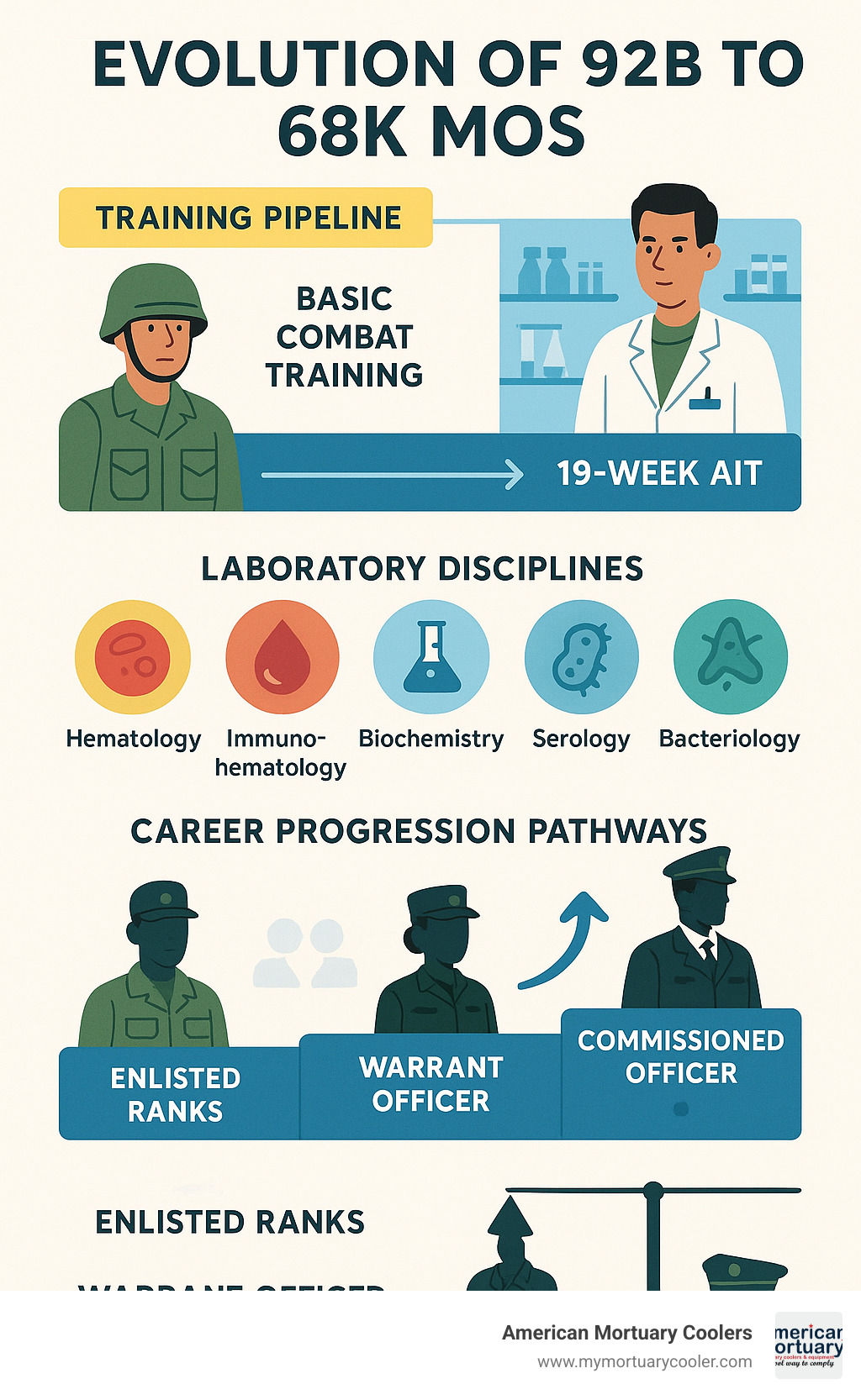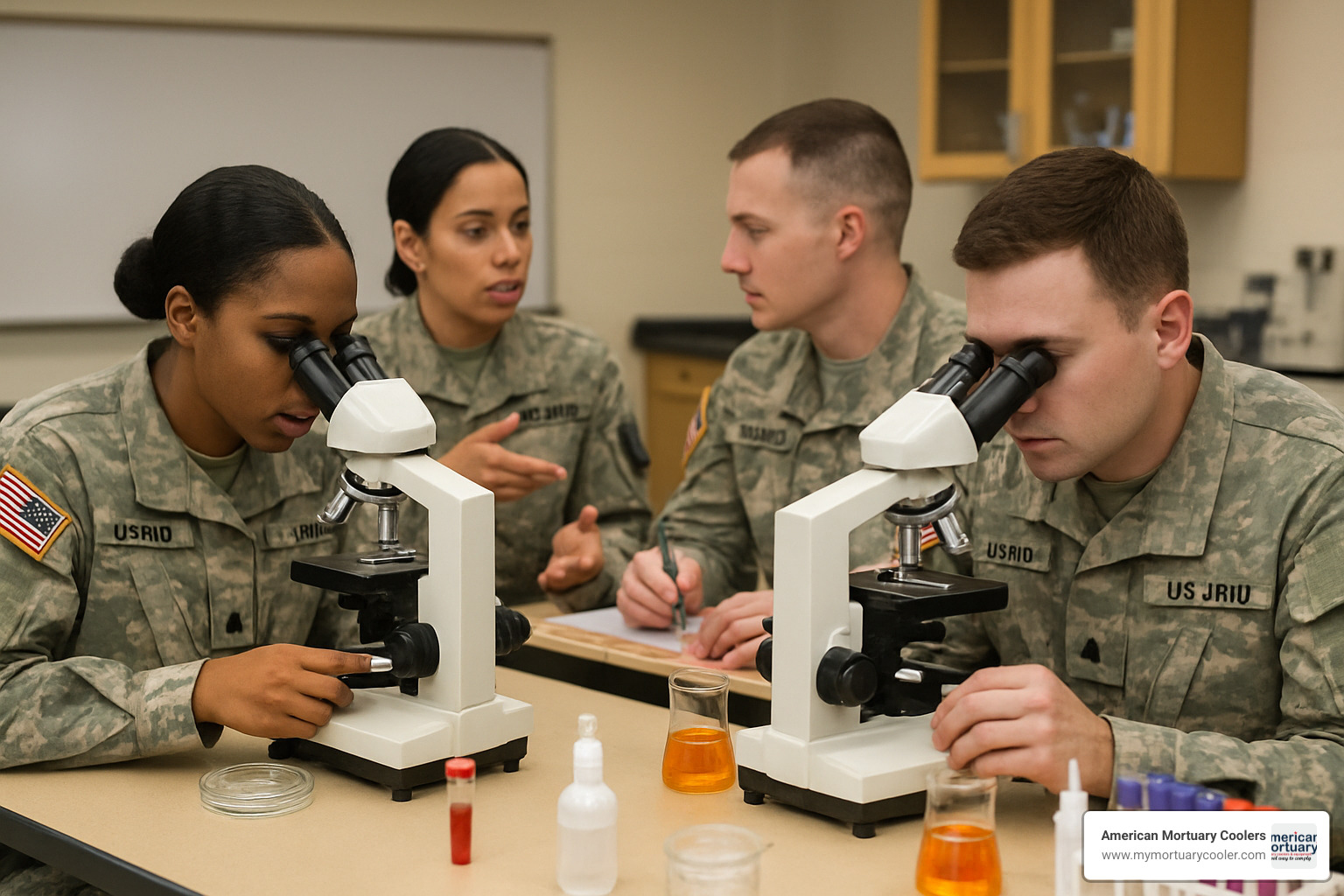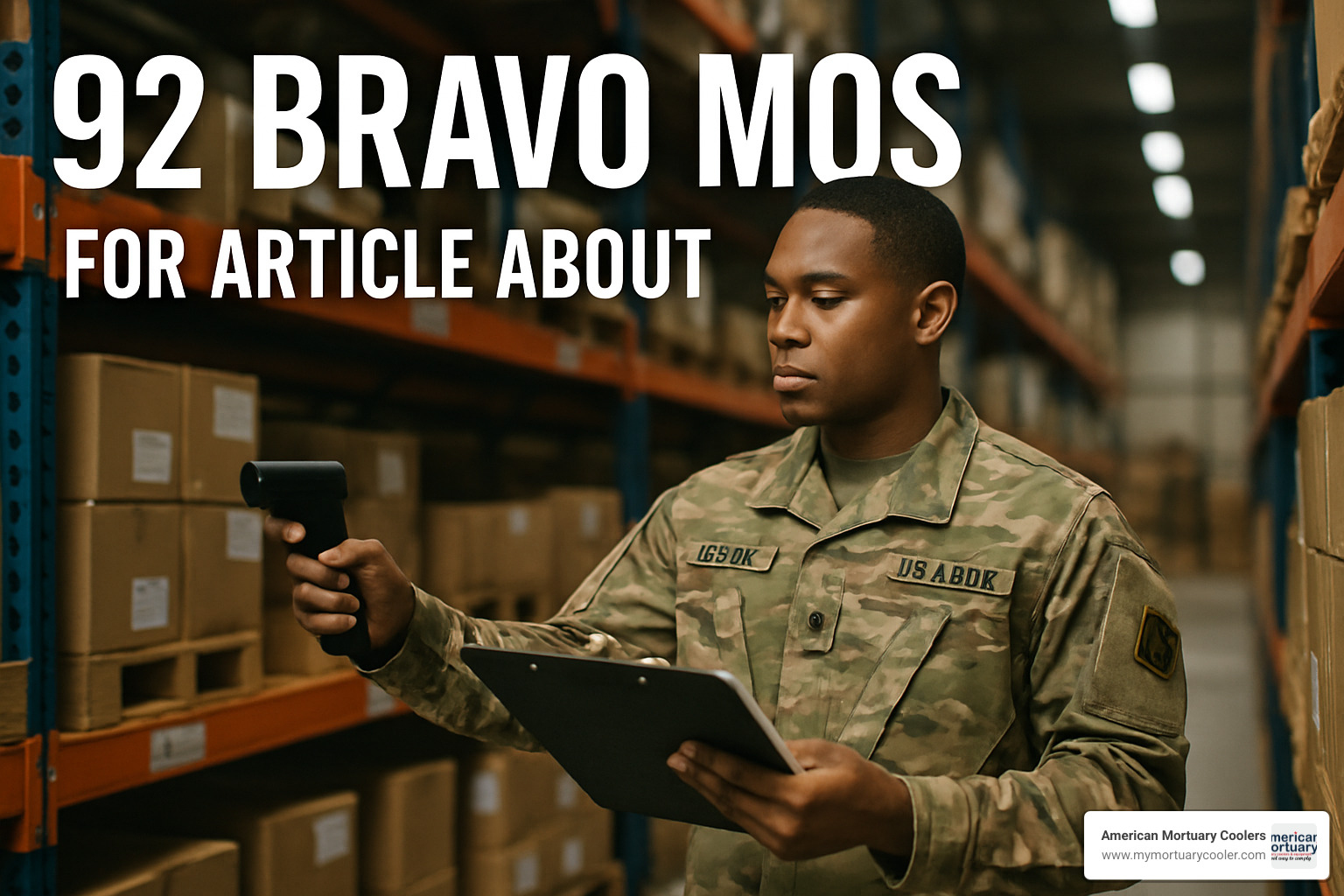
A–Z Guide to 92 Bravo MOS: Duties, Training, and Career Paths
Introduction
The 92 bravo mos was the Army's designation for Medical Laboratory Specialist until 2006, when it was reclassified to 68K as part of a broader medical MOS restructuring. The change grouped all laboratory roles under the 68-series career field, but the mission remains identical—delivering precise diagnostic data that saves lives in both garrison hospitals and combat zones.
Quick Facts About 92 Bravo MOS:
- Original Code: 92B (pre-2006)
- Current Code: 68K Medical Laboratory Specialist
- Training: 19 weeks of Advanced Individual Training
- Required ASVAB: ST score of 106 or higher
- Primary Duties: Clinical lab testing, blood banking, specimen analysis
- Career Field: Medical Service Corps (68-series)
Although you won't find active 92B positions today, understanding the MOS history explains the current 68K role. Medical laboratory specialists still conduct tests in hematology, immunohematology, biochemistry, serology, bacteriology, parasitology, and urinalysis while serving in military hospitals, field units, and deployed locations worldwide.
About the Author: I'm Mortuary Cooler from American Mortuary Coolers, and I've partnered with military medical facilities nationwide, supplying specialized refrigeration equipment that supports laboratory operations where former 92 bravo mos personnel now serve as 68K specialists. My decade-plus experience centers on helping these facilities maintain proper specimen storage and equipment functionality.

What is the 92 Bravo MOS? (Official Title, History & Mission)
The 92 bravo mos carried the official title of "Medical Laboratory Specialist" and served as a cornerstone of Army medical support for decades. Before 2006, these specialists worked under the Quartermaster Corps as part of the 92-series career field. Today, you'll find the same essential role continues as 68K Medical Laboratory Specialist under the Medical Service Corps.
The laboratory sciences these specialists master span an impressive range. They work in hematology (blood cell analysis), immunohematology (blood typing and compatibility), biochemistry (chemical analysis of body fluids), serology (immune system testing), bacteriology (bacterial identification), parasitology (parasite detection), and urinalysis (urine testing).
| Aspect | 92B (Pre-2006) | 68K (Current) |
|---|---|---|
| Career Field | Quartermaster Corps (92-series) | Medical Service Corps (68-series) |
| Official Title | Medical Laboratory Specialist | Medical Laboratory Specialist |
| Training Duration | 19 weeks AIT | 19 weeks AIT |
| Primary Duties | Clinical lab testing, blood banking | Clinical lab testing, blood banking |
| Supervisory Roles | Small/medium/large lab supervision | Same supervisory progression |
| Advanced Procedures | Virology, mycology, toxicology, histology | Same advanced procedures |
Why the Army Reclassified 92 Bravo MOS to 68K
The 2006 restructuring made real sense for the soldiers and the mission. Moving the 92 bravo mos from the Quartermaster Corps to the Medical Service Corps put medical laboratory specialists where they truly belonged.
The restructuring created better advancement opportunities. Under the new 68-series structure, medical laboratory specialists could more easily cross-train with other medical specialties and pursue leadership roles within the medical field.
How Medical Laboratory Specialists Support Army Missions
Whether they served as 92 bravo mos or current 68K specialists, these professionals provide diagnostic testing that directly impacts mission success.
During combat operations, they maintain blood banks for life-saving battlefield transfusions and conduct rapid diagnostic testing to identify infectious diseases. In garrison settings, these specialists handle routine medical testing that keeps the force healthy and support healthcare for military families.
Qualifications, ASVAB Scores & Training Pipeline
Getting into the former 92 bravo mos or today's 68K Medical Laboratory Specialist role requires specific qualifications. The Army has strict requirements because these specialists handle critical medical testing that can save lives.
The main requirement is the ASVAB score. You'll need either a Skilled Technical (ST) score of 106 or higher, or a General Technical (GT) score of 106. That's above average, which makes sense given the technical complexity of medical lab work.
Beyond test scores, you'll need U.S. citizenship for security clearance, a high school diploma, and the ability to pass physical fitness and medical examinations. Training includes Basic Combat Training followed by 19 weeks of Advanced Individual Training.

The training happens at Fort Sam Houston in Texas. Those 19 weeks make it one of the longer AIT programs in the Army. According to research on Army talent management, the Army invests heavily in this technical training because these specialists directly impact soldier health and mission readiness.
Physical & Medical Standards for 92 Bravo MOS
The physical requirements go beyond standard Army jobs. You'll need normal color vision since you'll be identifying different colored reactions in tests and examining specimens under microscopes.
Your fine motor skills need to be excellent for handling tiny specimens, operating precision instruments, and making measurements where accuracy matters. Medical requirements include staying current on immunizations, especially hepatitis B, since you'll work with potentially infectious materials.
Advanced Individual Training Curriculum Breakdown
The 19-week AIT program starts with laboratory fundamentals - safety protocols, basic chemistry and biology review, and quality control procedures.
Weeks 5 through 8 cover hematology and coagulation studies. You'll learn blood cell identification, counting techniques, and automated analyzer operation.
The clinical chemistry and immunology portion covers biochemical testing, blood banking, and infectious disease testing. Microbiology and parasitology training teaches bacterial identification and parasite recognition.
Final weeks focus on field operations and advanced procedures, including setting up deployable laboratories in challenging conditions.
Daily Duties, Work Environment & Key Skills
Life as a 92 bravo mos specialist means adapting to different work environments. You might work in a state-of-the-art hospital laboratory one day and set up a portable lab in a tent the next.
In garrison settings, former 92 bravo mos personnel work in climate-controlled hospital laboratories with sophisticated analyzers and proper resources. During deployments, field operations mean working with portable equipment in tents while maintaining the same accuracy standards despite dust, temperature changes, and limited space.
Your typical day starts with specimen collection and processing - drawing blood, collecting urine samples, and handling tissue specimens with care whether in a hospital or forward operating base.
Operating automated laboratory analyzers becomes second nature, but you'll also need troubleshooting skills when equipment malfunctions. Quality control testing ensures equipment gives accurate results, so commanders can trust your findings when making mission decisions.
As you advance in rank, supervisory responsibilities become important. You'll train new soldiers, manage laboratory schedules, and maintain high Army standards.

Essential Technical Skills for 92 Bravo MOS
The technical skills you'll master go beyond typical laboratory work. Microscopy and cell identification requires spotting abnormal cells that indicate health problems. Phlebotomy skills are essential - drawing blood efficiently while maintaining sterile technique takes practice.
Equipment calibration and maintenance becomes crucial in field environments. Data analysis and interpretation separates good specialists from great ones. Modern work also requires proficiency with laboratory information systems and electronic health records.
Personal Qualities That Drive Success
Attention to detail is absolutely critical when test results determine fitness for duty or medical treatment needs. Stress management becomes essential during deployments or emergencies. Teamwork makes laboratory operations run smoothly, involving coordination between multiple people. Leadership potential becomes important as you advance and supervise other soldiers. Continuous learning might be most important - medical technology evolves constantly, and staying current creates the best opportunities.
Career Progression, Certifications & Transition to Civilian Jobs
The career journey for someone who started in the 92 bravo mos follows the same path as today's 68K Medical Laboratory Specialists. You'll climb enlisted ranks from E-1 through E-9, with increasing responsibilities and leadership opportunities.
At E-1 to E-4, you'll master basic laboratory techniques. As you advance to E-5 and E-6, you'll take on team leadership and quality control responsibilities. At E-7 and E-8, you'll supervise entire laboratory operations. As an E-9, you'll serve as senior enlisted advisor for laboratory operations.
The Army offers two officer paths for former 92 bravo mos personnel: Warrant Officer 940A (Laboratory Sciences Technician) or commissioning as a 71E Laboratory Sciences Officer.
The Army's investment in your medical laboratory training creates excellent civilian career opportunities. Many veterans transition to hospital laboratories, blood banks, biotechnology firms, or the VA health system.
Earning Industry Certifications While in Service
Smart soldiers earn civilian certifications while in uniform. The ASCP-i (American Society for Clinical Pathology - International) certification is the gold standard recognized worldwide. The AMT (American Medical Technologists) certification offers an equally respected alternative.
CLIA Compliance Training is required for laboratory operations and shows employers you understand regulatory requirements.

Certified professionals earn higher salaries and get better job opportunities. The Army helps through tuition assistance, study materials, time off for examinations, and often reimburses certification fees.
Transitioning from 92 Bravo MOS to Civilian Healthcare Careers
Making the jump from military to civilian healthcare is easier than expected. Your military laboratory experience often exceeds civilian program training, giving you significant job market advantages.
Hospital laboratories always need skilled technicians for clinical testing. Blood banks offer specialized work in collection and processing facilities. Biotechnology companies need people with solid laboratory fundamentals for research roles. Public health laboratories offer government positions focused on disease surveillance.
The VA health system combines federal employment benefits with veteran hiring preferences. Your leadership experience is valuable to employers needing staff trainers and operation coordinators. Security clearance opens doors to specialized government and defense contractor positions.
Benefits, Compensation & Common Challenges
The financial picture for 92 bravo mos personnel and current 68K specialists goes beyond a simple paycheck. Military compensation creates a comprehensive package that often outpaces civilian entry-level positions.
Your base pay depends on rank and years of service, plus Basic Allowance for Housing (BAH) and Basic Allowance for Subsistence (BAS). You'll receive special pay during deployments or hazardous duty assignments.
Healthcare benefits alone save thousands annually. Medical, dental, and vision coverage extends to family members at no additional cost. Education benefits through tuition assistance let you earn college credits or professional certifications while serving.
Recent improvements to the Army's promotion system have created better advancement opportunities for technical specialists. According to Army pay changes research, centralized promotion board changes have streamlined career progression for medical laboratory specialists.
Challenges include night shift rotations since hospital labs never close, working weekends and holidays, and deployment stress affecting families during separations. The high responsibility can be mentally taxing when doctors need critical results to save lives. Physical demands of standing for hours while performing detailed microscopic work can be exhausting.
How to Overcome Typical Obstacles in 92 Bravo MOS
Smart strategies help you thrive despite challenges. Managing shift work starts with consistent sleep routines, blackout curtains, and regular meal times. Deployment stress support includes Family Readiness Groups and confidential counseling services designed for military stressors.
Work-life balance requires intentional effort. Take leave time seriously, participate in base recreation activities, and build genuine friendships with fellow soldiers. Mentorship from senior personnel can transform your career trajectory with practical advice for technical challenges and career decisions.
The continuing education requirement benefits long-term career prospects. Use tuition assistance strategically to earn certifications that boost civilian job prospects.
Frequently Asked Questions about 92 Bravo MOS
If you're considering a career as a medical laboratory specialist, you probably have questions about the former 92 bravo mos and its current 68K designation. Let me address the most common concerns I hear from prospective soldiers and their families.
What ASVAB score do I need for 92 Bravo MOS?
You'll need to score at least 106 on the Skilled Technical (ST) portion of the ASVAB to qualify for what was once the 92 bravo mos and is now the 68K Medical Laboratory Specialist position. Some recruiting stations may also accept a General Technical (GT) score of 106, though the ST score is the standard requirement.
This might seem like a high bar, but there's a good reason for it. Medical laboratory work involves complex scientific concepts, precise measurements, and critical thinking skills that directly impact patient care. The Army wants to ensure you have the aptitude to succeed in this demanding field.
If your scores are close but not quite there, don't give up. You can retake the ASVAB after waiting at least one calendar month, and there are study resources available to help you improve your performance.
How long is the training for 92 Bravo MOS?
The complete training pipeline takes about 30 weeks total from start to finish. You'll begin with Basic Combat Training, which runs approximately 10 weeks, followed by 19 weeks of Advanced Individual Training at Fort Sam Houston, Texas.
That 19-week AIT program is one of the longest in the Army, and for good reason. You'll be learning everything from basic laboratory safety to advanced microscopy techniques. The curriculum covers hematology, clinical chemistry, microbiology, immunohematology, and field laboratory operations.
Don't let the length intimidate you. The training is thorough because the Army wants you to be completely prepared for the responsibilities you'll carry. Many students find the hands-on laboratory work engaging and the time passes more quickly than they expected.
Can 92 Bravo MOS skills transfer to civilian careers?
This is one of the best aspects of choosing the former 92 bravo mos career field. Your military training will often exceed what civilian programs provide, giving you a significant advantage in the job market.
Veterans typically find excellent opportunities in hospital laboratories, blood banks, biotechnology companies, and government health agencies. The leadership experience you'll gain in the military is particularly valuable to civilian employers.
You'll also be well-positioned to earn industry certifications like ASCP (American Society for Clinical Pathology) or AMT (American Medical Technologists) while still in service. These credentials are highly respected in the civilian healthcare world and can significantly boost your earning potential.
Many veterans also find that their security clearance and attention to detail make them attractive candidates for specialized positions in research facilities and government laboratories. The VA health system actively recruits veterans with medical laboratory experience, offering federal employment benefits and familiar working environments.
The skills you develop will serve you well whether you choose to stay in healthcare or explore related fields. The analytical thinking, attention to detail, and technical expertise transfer to many other career paths as well.
Conclusion
The journey from 92 bravo mos to today's 68K Medical Laboratory Specialist tells a story of evolution and growth. While the Army changed the designation in 2006, the heart of this career remains the same - providing life-saving laboratory services that keep our military healthy and mission-ready.
These specialists wear many hats. They're technical experts who master complex laboratory procedures, military leaders who guide teams under pressure, and healthcare professionals who understand that accuracy can mean the difference between life and death. It's this unique combination that makes them so valuable, both in uniform and in civilian careers.
The career versatility speaks for itself. Former 92 bravo mos personnel and current 68K specialists find doors opening in hospital laboratories, research facilities, biotechnology companies, and government health agencies. The military training often exceeds what civilian programs offer, giving veterans a real advantage in the job market.
What makes this career path special isn't just the technical skills - it's the leadership experience and attention to detail that comes from working in high-stakes environments. Whether you're processing blood samples in a forward operating base or managing quality control in a garrison hospital, you learn to perform under pressure while maintaining the highest standards.
For those considering this path, the medical field connects to many other healthcare specialties. Military medical facilities rely on specialized equipment and infrastructure to maintain their operations. American Mortuary Coolers delivers durable, custom mortuary equipment across the contiguous 48 states, supporting the critical infrastructure that military medical professionals depend on. Our one-stop-shop for mortuary coolers serves facilities from coast to coast, understanding the precision and reliability that medical operations require.
The legacy of the 92 bravo mos lives on through every 68K Medical Laboratory Specialist who continues this proud tradition. They maintain the same commitment to technical excellence and military professionalism that has always defined this essential career field. Whether you're starting your military journey or planning your transition to civilian healthcare, this path offers both meaningful work and excellent career prospects.




